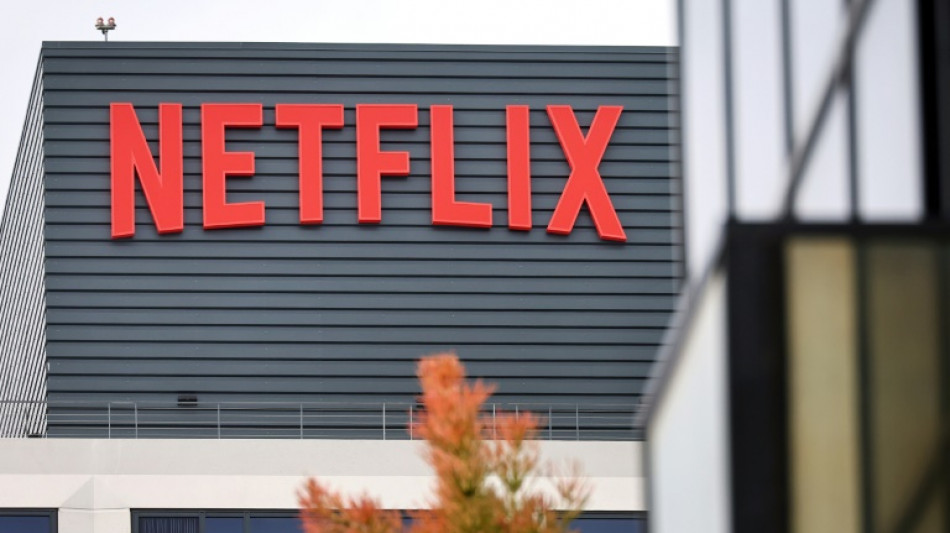
-
 Kishan hits quickfire 77 as India make 175-7 in Pakistan showdown
Kishan hits quickfire 77 as India make 175-7 in Pakistan showdown
-
Shiffrin takes positives after falling short in Olympic giant slalom

-
 Oh! Calcutta! -- how did England lose to Scotland in Six Nations?
Oh! Calcutta! -- how did England lose to Scotland in Six Nations?
-
Brignone strikes Olympic gold again as Klaebo becomes first to win nine

-
 Marseille sporting director Benatia quits club
Marseille sporting director Benatia quits club
-
History-maker Brignone completes Olympic fairy tale as Shiffrin's medal misery continues

-
 Brignone claims second Olympic gold, Shiffrin misses podium
Brignone claims second Olympic gold, Shiffrin misses podium
-
Evans wins Rally Sweden to top championship standings

-
 No handshake between India, Pakistan captains before T20 World Cup clash
No handshake between India, Pakistan captains before T20 World Cup clash
-
French 'ultra-left' behind killing of right-wing youth: justice minister

-
 Forest appoint Pereira as fourth boss this season
Forest appoint Pereira as fourth boss this season
-
Norwegian cross-country skier Klaebo wins a Winter Olympics record ninth gold

-
 'King of the Moguls' Kingsbury bows out on top with Olympic dual moguls gold
'King of the Moguls' Kingsbury bows out on top with Olympic dual moguls gold
-
Hiam Abbass says 'cinema is a political act' after Berlin row

-
 'Imposter' Nef shooting for double Olympic gold
'Imposter' Nef shooting for double Olympic gold
-
Brignone leads giant slalom in double Olympic gold bid, Shiffrin in striking distance

-
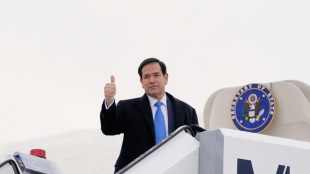 After Munich speech, Rubio visits Trump's allies in Slovakia and Hungary
After Munich speech, Rubio visits Trump's allies in Slovakia and Hungary
-
England's Banton at home in first World Cup after stop-start career

-
 Australia's Aiava slams 'hostile' tennis culture in retirement post
Australia's Aiava slams 'hostile' tennis culture in retirement post
-
Nepal recover from 46-5 to post 133-8 against West Indies

-
 Emotional Kim captures first title in 16 years at LIV Adelaide
Emotional Kim captures first title in 16 years at LIV Adelaide
-
Exiled Kremlin critic on fighting Putin -- and cancer -- from abroad

-
 Berlinale filmmakers make creative leaps over location obstacles
Berlinale filmmakers make creative leaps over location obstacles
-
I want answers from my ex-husband, Gisele Pelicot tells AFP
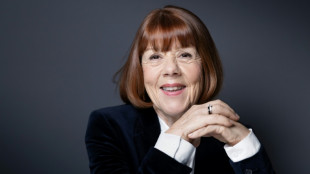
-
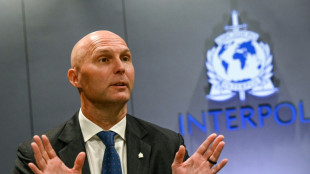 Interpol backroom warriors fight cyber criminals 'weaponising' AI
Interpol backroom warriors fight cyber criminals 'weaponising' AI
-
New world for users and brands as ads hit AI chatbots

-
 Japan's 'godless' lake warns of creeping climate change
Japan's 'godless' lake warns of creeping climate change
-
US teen Lutkenhaus breaks world junior indoor 800m record

-
 World copper rush promises new riches for Zambia
World copper rush promises new riches for Zambia
-
Paw patrol: Larry the cat marks 15 years at 10 Downing Street

-
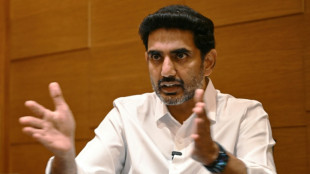 India plans AI 'data city' on staggering scale
India plans AI 'data city' on staggering scale
-
Jamaica's Thompson-Herah runs first race since 2024

-
 Crash course: Vietnam's crypto boom goes bust
Crash course: Vietnam's crypto boom goes bust
-
Ahead of Oscars, Juliette Binoche hails strength of Cannes winners

-
 US cattle farmers caught between high costs and weary consumers
US cattle farmers caught between high costs and weary consumers
-
New York creatives squeezed out by high cost of living

-
 Lillard matches NBA 3-point contest mark in injury return
Lillard matches NBA 3-point contest mark in injury return
-
NBA mulling 'every possible remedy' as 'tanking' worsens
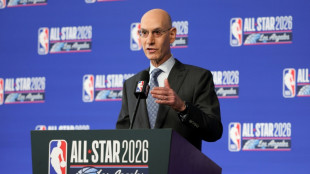
-
 Team USA men see off dogged Denmark in Olympic ice hockey
Team USA men see off dogged Denmark in Olympic ice hockey
-
'US-versus-World' All-Star Game divides NBA players

-
 Top seed Fritz beats Cilic to reach ATP Dallas Open final
Top seed Fritz beats Cilic to reach ATP Dallas Open final
-
Lens run riot to reclaim top spot in Ligue 1, Marseille slip up

-
 Last-gasp Zielinski effort keeps Inter at Serie A summit
Last-gasp Zielinski effort keeps Inter at Serie A summit
-
Vinicius bags brace as Real Madrid take Liga lead, end Sociedad run

-
 Liverpool beat Brighton, Man City oust Beckham's Salford from FA Cup
Liverpool beat Brighton, Man City oust Beckham's Salford from FA Cup
-
Australia celebrate best-ever Winter Olympics after Anthony wins dual moguls

-
 Townsend becomes a fan again as Scotland stun England in Six Nations
Townsend becomes a fan again as Scotland stun England in Six Nations
-
France's Macron urges calm after right-wing youth fatally beaten
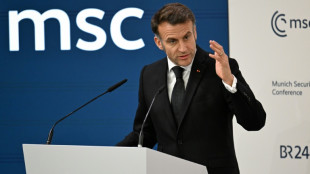
-
 China's freeski star Gu recovers from crash to reach Olympic big air final
China's freeski star Gu recovers from crash to reach Olympic big air final
-
Charli XCX 'honoured' to be at 'political' Berlin Film Festival


In volatile election season, US companies battle 'brand disinformation'
From Google to Netflix, prominent US companies are battling internet boycott calls over their perceived political leanings in a polarizing election season that has exposed them to what researchers call "brand disinformation."
The online campaigns, which falsely claim both Netflix and Google are funding or favoring Democratic nominee Kamala Harris ahead of the November election, illustrate how brands are vulnerable to political falsehoods that can expose them to financial perils.
Those calling for a boycott, researchers say, include fake accounts on the platform X. The site is owned by Elon Musk, who has endorsed Donald Trump and appears to exert an outsized influence on voters through the platform, which has become a hotbed of disinformation.
The recent boycott calls targeting Netflix, which also spread on other platforms such as TikTok and Instagram, were triggered by false claims of a $7 million donation from the streaming service to Harris's campaign, AFP fact-checkers reported.
Reed Hastings, the service's co-founder and executive chairman, made a contribution to Vice President Harris's campaign but the company said it was a "personal donation" and had "no connection to Netflix."
Still, calls to "cancel Netflix" flooded social media sites, with many users falsely claiming the company was indirectly funding the Harris campaign. Some shared screenshots of their canceled subscriptions.
Nearly a quarter of the boycott calls on X were traced to fake profiles, which have consistently expressed support for Trump through the past year, according to the disinformation security company Cyabra.
"Brand disinformation campaigns in today's polarized climate have far-reaching impacts beyond just corporate reputation," Dan Brahmy, Cyabra's chief executive, told AFP.
"The Netflix case demonstrates how rapidly these campaigns spread, potentially reaching hundreds of millions" and shows how "disinformation can manipulate public opinion and consumer behavior," he said.
- 'Delicate balancing act' -
As the hotly contested election nears, Brahmy cautioned, "brands must be vigilant."
Similar boycott calls recently targeted Google after unfounded claims that the company censors election-related content and manipulates search engine results in favor of Harris.
Cyabra identified hundreds of fake profiles on X –- many with a recent history of pro-Trump content -– which called for a boycott of the tech giant while promoting another search engine.
Musk, who has repeatedly criticized Google, played a "significant role in amplifying negative content" against the company, Cyabra said in a report.
In one evidence-free tweet in late July, Musk wrote: "Wow, Google has a search ban on President Donald Trump! Election interference?"
Google did not respond when AFP asked about the allegations, or about the impact of the boycott calls.
Earlier this month, a survey by the portal Sitejabber showed 30 percent of respondents had boycotted a brand over political reasons in the past 12 months, while 41 percent said they prefer that companies keep their "political positions private."
"Brands face a delicate balancing act this election year," Michael Lai, chief executive of Sitejabber, told AFP.
"While staying apolitical may seem safe, it's important for businesses to understand that even neutrality can be interpreted as a position."
- 'Chaos and distrust' -
Another survey by market research firm Certus Insights showed that consumers were divided over whether corporations should engage in partisan politics, with more than half the respondents saying companies should refrain from doing so.
Other surveys suggest consumers consider it the brand's fault if its advertising appears next to polarizing, false or defamatory content.
Such concerns have prompted many advertisers to abandon X, which has scaled back content moderation and restored once-banned accounts known to peddle disinformation or hate following Musk's 2022 acquisition of the platform.
Some also left in light of Musk's own controversial musings on the site.
Earlier this month, X sued an advertising group and several large corporations, accusing them of causing billions of dollars of losses by "illegally" boycotting his site.
"Disinformation creates chaos and distrust. Brands normally benefit from a well-informed society," Claire Atkin, co-founder and chief executive of the anti-disinformation watchdog Check My Ads, told AFP.
"On the internet, advertisers have let tech companies take their ads away from the news and straight into the arms of bad actors. Now, unfortunately, we are all experiencing the consequences."
P.M.Smith--AMWN